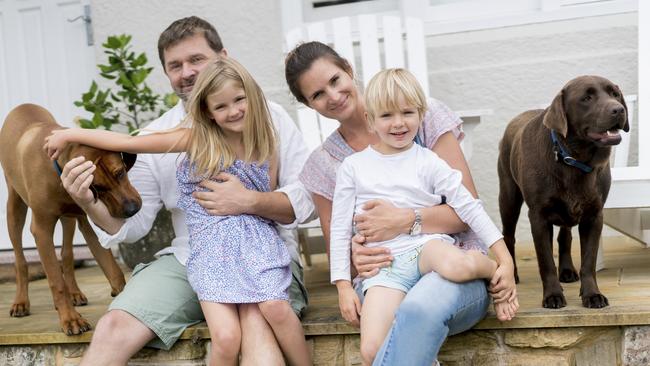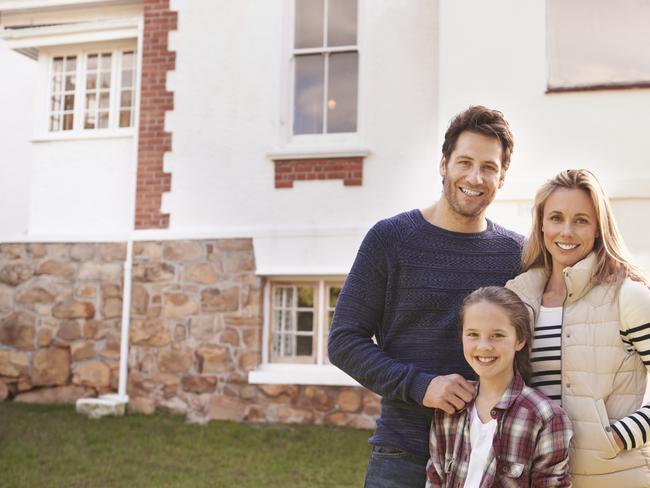Scott Pape on why he rarely tells people to sell family homes
BAREFOOT Investor Scott Pape often tells people up to their armpits in debt to sell their cars, investment properties and jetskis — but rarely the family home. Here’s why.

Barefoot Investor
Don't miss out on the headlines from Barefoot Investor. Followed categories will be added to My News.
WHAT follows is a true story … however, I’ve changed the names to protect the innocent.
Mick arrived home, totally buggered after a two-week stretch at the mines.
It was well past midnight … yet he noticed the light in the lounge room was still on.
He kicked off his steel-capped boots, quietly walked inside, and found Mandy, his wife of six years, waiting for him.
Mick sensed something wasn’t right.
“We’re broke,” she announced.
“Babe, I know things are a bit tight right now ... but we’ll get through,” he said supportively.
“No ... you don’t understand … we’re really broke,” she huffed, and then collapsed in tears.
Through her sobs, she squeaked out the damage:
“Eleven thousand on our NAB credit card …. nineteen thousand on the Visa … thirty-four thousand on the personal loan … and … we’re behind on the home loan.”

Mick stared at her for a full 30 seconds, speechless.
He had no idea they had any of these debts.
As in none.
Not even an inkling.
As far as he knew, they had a $600,000 mortgage on their $700,000 home, and a $20,000 car loan for his ute — both of which they could meet on their current income.
They have a traditional marriage: Mick brings home the bulk of the bacon, working as a carpenter in the mines.
Mandy works in a bank (or at least she used to, until she was laid off a year ago), and also keeps the home fires burning — managing the money, and running after their three-year-old daughter.
So how did Mandy end up almost bankrupting them?
She didn’t gamble.
She wasn’t extravagant in her spending.
The truth was more Kath and Kim than Kim Kardashian: she fell into a bout of depression after losing her job, and simply continued spending like she was still working.
Basically, she blocked everything out and borrowed up big.
Mick paid no attention to the bills — he didn’t see it as his job.
Instead he took the role of being the provider.
When Mick reached out to me, he admitted that his marriage was holding on by a thread.
“I trusted that my wife — the mother of my child — would do the right thing by us … clearly I was wrong”, he said.
BAREFOOT INVESTOR: KNOWLEDGE KEY TO DODGING FINANCIAL BULLET

Worse, he was worried about the impact their constant fighting was having on their daughter. Their financial situation was suffocating him, so he made the drastic step of putting the family home on the market. “I don’t think we have any other option”, he told me.
I took a look over their finances — and disagreed.
If you’ve read my column long enough you’ll have seen that I often tell people who are up to their armpits in debt to sell their cars, their investment properties and their jetskis without so much of a second thought.
But it’s rare that I advise people to sell their family home.
That’s because your family home is both a financial and an emotional asset.
It’s your castle, and you should be prepared to fight to keep it — do whatever it takes — if you can.
Besides, I’ve seen people go through the heartbreak (and expense) of selling their home, extinguish their debts … and then continue spending and ultimately be no better off.

THE BAREFOOT DATE NIGHT
Financially, life was simpler a generation ago: houses were comparatively cheap, and household debts were more manageable (even though interest rates were higher).
With less financial pressure, many mothers were able to stay at home longer and look after the kids.
Not now.
Any young couple living in a capital city both have to work to pay the bills (including childcare).
Life is … busy … and very, very expensive.
This is the reason I based my book around the concept of Barefoot Date Nights. It’s more important than ever to both be on the same page when it comes to money.
Now as the Barefoot Investor I’d love it if Liz put our teething son down to bed and then said “Honey, how about we fool around … on your spreadsheet.” But that … has never, ever happened.
So instead I have focused on a date night once a month (ours is the first Tuesday of the month … the same day as the Reserve Bank meets to determine official interest rates … how hot is that?).
We get dressed up.
(Okay, my wife gets dressed up.)
We go out to dinner, have a glass of wine (or two), and talk about our money.
BAREFOOT INVESTOR: THE HOUSE THAT DEBT BUILT

We talk about expenses that are coming up, and goals we’d like to achieve, and I bore her talking about shares.
We’ve purposely made this a ritual in our marriage — because it turns something boring into something to look forward to.
(And in my book, I set out five weeks of date nights that can save you tens of thousands of dollars by building out your financial infrastructure and getting better deals.)
MICK AND MANDY GO TO DINNER
And it was this advice that I gave to Mick and Mandy.
Truth was that Mick had to shoulder some blame for the situation they were in. After all, he gave her a hospital handpass by lumping the responsibility on her to manage all the money.
What’s more, if he’d known what was going on, he could’ve stepped in earlier. Yet it was also true that Mandy had broken Mick’s trust.
She had to rebuild it, and the way she could do that was twofold: get a job and contribute, and commit to having a weekly date night.
Today they’ve taken their home off the market, and they’re working as a team to dig themselves out of debt.
Tread Your Own Path!
Knowledge is key to dodging a financial bullet
Scott Morrison and the house that debt built
Wealth needs to be maintained and backed up by a bigger purpose in life
Originally published as Scott Pape on why he rarely tells people to sell family homes


